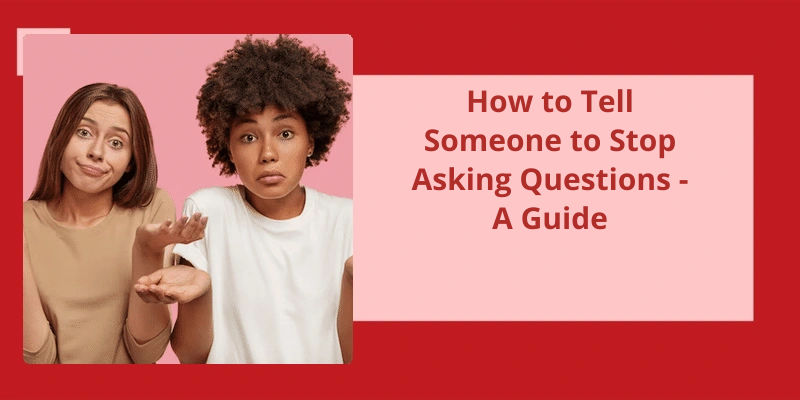Asking questions is a natural human tendency that often arises from genuine curiosity and a desire to learn more about the world. However, there are times when incessant questioning can become overwhelming and intrusive, especially when the questioning is unwanted or uninvited. In such situations, it can be challenging to find a way to politely and effectively tell someone to stop asking questions without causing offense or sparking an argument. Fortunately, there are a variety of tried-and-true techniques that can help you avoid answering unwanted questions, ranging from subtle deflections and humorous jokes to more direct approaches such as changing the subject or setting boundaries. By employing these strategies, you can gracefully navigate tricky conversational situations and maintain control over your privacy and personal space.
How Do You Deal With Someone Who Keeps Asking the Same Question?
Instead, try to listen carefully and understand where the other person is coming from. Are they struggling to comprehend the topic or are they looking for a specific piece of information? By clearly identifying the root of the problem, it’s easier to resolve it. If it’s a comprehension issue, try breaking down complex ideas into smaller ones. Use analogies, anecdotes or visual aids if possible. If the issue revolves around a lack of information, provide clear and concise answers.
Another effective strategy is to redirect the question. If a person is stuck on a particular point, try moving the conversation forward. Acknowledge the question but suggest that youve answered it and theres another area to cover. This technique can be very useful in group settings, where limited time means that answers to all questions may not be possible.
Anticipating questions can also be a helpful tool. By presenting information in a clear and structured format, with anticipated queries addressed at the beginning or end of a presentation, it not only saves time, but it also reduces the likelihood of repetition later on. Furthermore, it shows that youre thorough and empathetic in your approach.
Having said that, some people may ask the same question repeatedly due to anxiety or other mental health issues. In such cases, patience and kindness are essential. Try to understand the situation and the reasons behind the questioning. Address the underlying concern and show your support. Referring someone to professional help might also be necessary.
Lastly, it’s important to remember that were all human, and we all have our limits. If a situation becomes too frustrating, it’s okay to take a break or step back. It’s better to return when emotions have cooled down and more productive communication is possible.
Tips on How to Manage Your Own Frustration and Emotions When Dealing With Someone Who Keeps Asking the Same Question.
- Take a deep breath and try to remain calm.
- Remember that the person asking the question may have a legitimate reason for not understanding the answer.
- Try to rephrase the answer in a different way or provide additional examples.
- Take a break if necessary to avoid getting overwhelmed.
- Focus on the situation at hand and try not to take the repeated question personally.
- Seek support from a trusted friend or colleague if needed.
- Consider setting boundaries or providing additional resources to help the person understand the answer.
While it’s great to have a curious mind and a desire to learn, it can be overwhelming for others when one person asks an excessive amount of questions. If you find yourself in a situation where someone is constantly bombarding you with inquiries, it’s important to address the issue in a kind and constructive way. You don’t want to discourage their enthusiasm for learning, but you also need to establish boundaries and find a way to help them become more self-sufficient.
How Do You Tell Someone to Stop Asking So Many Questions?
Communication is a vital aspect of any relationship, but sometimes, excessive questioning can be a bit overwhelming. If you notice someone asking too many questions, it’s essential to approach the situation sensitively. Identifying the root cause of the inquisition is the first step in understanding the reason for the interrogation.
When it comes time to address the issue, remember to approach the conversation with compassion and sensitivity. It’s important to start by acknowledging and validating their enthusiasm and curiosity while recognizing that it might be more productive for them to learn through self-discovery rather than constant questioning.
One way to begin is by setting boundaries. You can kindly explain that you’ve time constraints or that their questions can be overwhelming at times. Encourage them to explore answers to their inquiries independently, and demonstrate how to utilize resources available to them, such as research or books.
Another option is to steer the conversation towards a specific topic to avoid getting bogged down in an endless stream of questions. This approach can be helpful, emphasizing that youd prefer to focus on addressing a specific issue or challenge rather than spending too much time discussing various topics.
It’s also beneficial to consider whether the questioning is driven by a personal need for constant reassurance or simply a natural curiosity to learn and grow. Setting clear expectations and limits can help stem excessive questioning, but remember to be mindful of how your actions may influence their willingness to ask questions in the future.
In summary, when navigating excessive questioning, it’s essential to remain compassionate and sensitive. Encouraging people to be more self-sufficient and offering guidance for tackling difficult topics independently can significantly benefit them in the long run. Remember to validate their curiosity while also setting clear boundaries and recognizing the importance of their inquisition. By doing so, you can create a healthier communication dynamic that fosters growth and collaboration.
How to Identify the Root Cause of Excessive Questioning
One way to identify the root cause of excessive questioning is to look for patterns in the questions being asked. Are they focused on a particular topic or issue? Are they being asked at a certain time or in a certain setting? Additionally, it may be helpful to explore the individual’s personal history and experiences to understand why they feel the need to ask so many questions.
Effective communication is an important skill in both personal and professional interactions. When it comes to asking questions, it can be easy to unintentionally offend or come across as insensitive. However, there are some simple steps you can take to ensure that your questions are received positively and that you’re understood clearly. The first of these steps is to listen actively to the other person, rather than just waiting for your turn to speak. In this way, you can show respect and consideration for their perspective, while also gathering the information you need to navigate the conversation effectively.
How Do You Ask a Question and Not Be Rude?
Show sincere interest in what they’ve to say by making eye contact, nodding, and asking follow-up questions. This lets the other person know that you value their opinions and that you’re invested in the conversation. Interrupting or talking over the other person can come across as rude and dismissive, so be patient and wait for your turn to speak.
When asking a question, it’s important to frame it in a respectful and non-confrontational way. Avoid using accusatory or judgmental language that could provoke defensiveness or hostility. Instead, use “I” statements to express your own feelings or concerns. For example, instead of saying “why did you do that?”, you could say “Im curious to understand your thought process – could you tell me more about why you made that decision?”.
Consider the context and timing of your question. It’s important to be aware of the other persons emotional state and their availability to engage in conversation. If someone is clearly upset or stressed out, it might not be an appropriate time to ask a sensitive or personal question. Similarly, if someone is in the middle of a task or conversation with someone else, it’s probably best to wait until they’re free to give you their full attention.
Be mindful of your tone of voice and body language when asking a question. Even if your words are polite, a sarcastic or aggressive tone can easily undermine your message. Similarly, crossing your arms or avoiding eye contact can come across as defensive or closed-off. Instead, try to maintain an open and approachable demeanor that invites conversation and collaboration.
Finally, be prepared to accept the other persons answer, even if it isnt what you were hoping to hear. Respecting someone elses perspective and choices doesn’t mean you’ve to agree with them, but it does mean acknowledging their right to their own opinions and feelings. If you feel strongly about something and want to continue the conversation, you could try expressing your viewpoint in a non-confrontational way and asking for their thoughts. Remember, the goal of asking a question isn’t to prove your point or win an argument, but to understand and connect with other people.
Learning how to draw boundaries in social situations can be a delicate matter, especially when it involves deflecting personal questions. It isn’t always easy to confront someone who prides themselves on being over-involved in your personal life, but the ability to say “no” is crucial for maintaining healthy relationships. In this upcoming section, we will discuss practical methods for politely conveying your desire for privacy and strengthening personal boundaries.
How to Politely Tell Someone to Stop Asking Personal Questions?
A good way to approach this is by first establishing boundaries. You can let the person know that you’re comfortable discussing certain topics, but there are other areas that you’d prefer to keep private. This will help to prevent further inquiries that may cause discomfort or lead to discomfort.
It’s also important to stay polite and respectful when you’re telling someone to stop asking personal questions. You can use phrases like “I appreciate your interest, but Id rather not discuss this right now” or “Im sorry, but I don’t feel comfortable discussing that topic with you.”. This will communicate your boundaries without coming off as rude or harsh.
If the person persists, you can also try redirecting the conversation. For example, you can change the subject to something more general, or ask the person questions about themselves to turn the focus away from you. This way, you can control the direction of the conversation without being confrontational.
Another approach is to appeal to the persons sense of empathy. You can let them know that discussing certain topics is uncomfortable or even upsetting for you, and that you’d appreciate their understanding in respecting your boundaries. Often, people will respond positively to a polite request that comes from a place of vulnerability.
By setting boundaries, staying polite, redirecting the conversation, appealing to empathy, and standing by your decision, you can effectively communicate your desire for privacy without damaging the relationship. Remember, your personal life is your own, and it’s perfectly okay to want to keep parts of it private.
Outlining Specific Examples of Personal Questions That Make People Uncomfortable and How to Address Them
- What’s your salary?
- What’s your religion?
- Have you ever been arrested?
- What’s your sexual orientation?
- Have you ever had an abortion?
- Do you’ve any medical conditions?
- What’s your political affiliation?
- Have you ever been in therapy?
While asking questions is an important part of communicating and gaining knowledge, it’s possible to overdo it. When someone asks too many questions, it can be frustrating and irritating. It may seem like they’re not putting in effort or being overly reliant on others. In this article, we’ll delve into why some people ask too many questions and how you can deal with it if you find yourself annoyed by these inquisitive individuals.
Why Is Asking Too Many Questions Annoying?
Appearing to be Invasive, constantly peering into your personal life without any reasonable sense of privacy. It can also be seen as Disrespectful, if the questions border on topics that are deemed too sensitive or controversial. Indeed, asking too many questions can rub people the wrong way for several reasons.
One of the main reasons why people find excessive questioning irritating is that it can be disruptive, particularly if youre trying to concentrate on something more important. For example, if someone is asking you a series of questions while youre busy with your work, it can be quite annoying. The constant interruption can derail your thought process and make it difficult to focus on the task at hand.
People have different ideas of what constitutes personal space, but generally, everyone has some subjects that they consider private, such as finances, relationships, and health. When someone starts asking these types of questions, especially if theyre not someone we trust enough to share this information with, it can feel like a violation of our privacy.
Moreover, asking too many questions can also imply that the person asking doesn’t trust us or our judgment. Suppose someone constantly queries our decisions or actions, suggesting that they think we might do something the wrong way. In that case, it can be quite frustrating, and in some cases, it can even feel like an attack on our competence or ability.
Furthermore, it takes effort and energy to formulate answers to questions. So when people ask too many questions, it can feel like theyre not respecting our time or intellectual effort. Many people also tend to ask the same questions repeatedly without acknowledging that theyve already been answered. So it can make us feel like our efforts aren’t being recognized or appreciated.
The solution is to strike a balance and be mindful of how many questions were asking and whether theyre appropriate in the given context. If we can do this, well be able to communicate more effectively and avoid annoying the people around us.
How to Communicate Your Boundaries and Limits When It Comes to Personal Questions
- Start by setting clear boundaries for yourself about what you’re comfortable discussing with others.
- Communicate your boundaries clearly and confidently, without apology.
- Use “I” statements to express your feelings and needs.
- Offer alternative topics for discussion or redirect the conversation if it makes you uncomfortable.
- Remember that you’ve the right to privacy and to set your own boundaries.
- Practice saying no to personal questions that are intrusive or make you uncomfortable.
- Be respectful and assertive in your communication, but also be willing to listen to others’ perspectives.
- Remember that it’s okay to change your mind about what you’re willing to discuss and to adjust your boundaries accordingly.
Conclusion
In conclusion, there are countless ways to address unwanted questions without being rude or confrontational. These tricks range from enlisting the help of a friend to simply reframing or deflecting the question in a humorous or subtle manner. By utilizing the various strategies highlighted in this article, individuals can take control of uncomfortable and intrusive conversations, making them more comfortable and enjoyable. Whether attempting to avoid personal or professional inquiries, implementing these tactics can help foster healthy boundaries and respectful communication.






